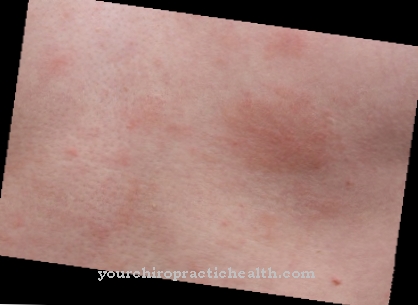Burning vagina or a Burning in the vagina is a symptom that can have various causes. Burning vagina is often associated with shame in women; However, an early visit to the doctor can often help.
What is vaginal burning?
.jpg)
A burning pain in the vagina of women is called vaginal burning. One can Burning in the vagina occur in women of all ages.
Burning pain in the vagina is often accompanied by increased discharge of secretion, the so-called fluorine vaginalis. Severe itching is also often associated with a burning sensation in the vagina. This itching is also known in medicine as genital pruritus.
Itching in connection with a burning sensation in the vagina is typical of the itching that increases under the influence of heat. If such itching is only present for a short time, it is usually a harmless symptom.
Women who are affected by vaginal burning often report painful sensations during intercourse or sometimes when using tampons for menstrual hygiene.
causes
There are various possible causes for vaginal burning: Often a burning sensation in the vagina is based on bacterial vaginal infections. Bacteria lead to inflammation, especially if the protective mechanism of the mucous membrane in the genital area is influenced. Medical terms for such bacterial infections with burning in the vagina are, for example, 'vaginosis' or 'vaginitis'.
Other possible causes of a burning sensation in the vagina are yeast infections (also known as vaginal yeast infections). It is estimated that at least 75% of all women will be affected by such an infection at least once in their lifetime.
In addition, causes of a burning sensation in the vagina can be various contact allergies (for example to soaps or care products) or diseases that can be transmitted during sexual intercourse (such as gonorrhea; popularly also known as gonorrhea).
Diseases with this symptom
- Cystitis
- Vulvodynia
- Bacterial vaginosis
- gonorrhea
- Genital warts
- Chlamydial infection
- Vaginitis
- Candidosis
- Trichomoniasis
- Herpes simplex
- Vaginal fungus
- Contact allergy
Diagnosis & course
In order to determine the specific cause of a Burning vagina To find out, it is often advisable to visit a gynecologist. As a rule, a gynecologist will first ask about the exact symptoms and inquire about any previous illnesses. Such a conversation is usually followed by a targeted examination:
It is common to take a so-called smear, i.e. a sample of the vaginal mucous membrane flora, in order to be able to find clues under the microscope for the cause of the vaginal burning sensation. If the burning sensation in the vagina is caused by inflammation of the mucous membrane, the vaginal mucous membrane may also show a slight reddening.
For example, visible coatings on the vaginal mucous membrane during the examination would suggest a fungal infection. The course of a burning sensation in the vagina then depends, among other things, on the length of the underlying disease and when treatment is started.
Complications
A burning sensation in the vagina is a symptom that most adult and sexually active women will attribute to vaginal thrush.Mostly they are actually right and then treat themselves with a vaginal cream or accompanying vaginal tablets. If you do not use a broad spectrum active ingredient, there is a risk that you will treat the vaginal thrush with the wrong medication and that the active ingredient will not be able to work against the fungus that is responsible for the burning sensation in the vagina.
It is therefore advisable to consult your doctor if you suspect vaginal thrush and have him examine the burning sensation in the vagina even if the fungus has disappeared recently and the same pathogen can only be returned. Otherwise, incorrect treatment can lead to the fungus becoming even more stubborn and the burning sensation in the vagina not going away for a long time.
Since vaginal burning is so often associated with vaginal thrush, there is still a risk of missing out on other causes. For example, it could be an overly sensitive reaction to latex if the vagina has come into contact with it shortly beforehand, for example through condoms or sex toys. However, a doctor can determine the cause of the burning sensation in the vagina.
When should you go to the doctor?
A burning sensation in the vagina can occur briefly and have harmless causes that do not require further clarification. The situation is different with long-lasting or frequent vaginal burning. Often this is accompanied by itching and discharge. People with a burning sensation in the vagina also often complain of pain during sexual intercourse and when using tampons. Some women feel ashamed to see a doctor if they have a burning sensation in the vagina. However, a visit to the doctor is essential if you have a vaginal burn. Shame is unnecessary here, because patients with a burning sensation in the vagina are everyday work for doctors.
The gynecologist is responsible for treating the burning sensation in the vagina. A vaginal burn is often caused by a yeast infection or a bacterial vaginal inflammation. Sexually transmitted diseases, particularly gonorrhea, also known colloquially as gonorrhea, also play a role in vaginal burning. If the causes of vaginal burns are treated late due to a delayed visit to the doctor, this can unnecessarily complicate and prolong the therapy.
If there is a burning sensation in the vagina, a possible contact allergy should also be considered, for example to latex or certain personal cleansing products. In the case of vaginal thrush and venereal diseases in particular, as a trigger for the burning sensation in the vagina, it is advantageous to also involve the partner in the treatment process.
Doctors & therapists in your area
Treatment & Therapy
Successful treatment of vaginal burning is based on treating the cause of the burning sensation in the vagina: If a bacterial vaginal inflammation is responsible for the burning sensation, the gynecologist can, for example, prescribe antibiotics (to fight the bacteria).
If a burning sensation in the vagina is due to a fungal infection, the administration of so-called antimycotics (drugs that kill fungi or inhibit their growth) can be an effective therapeutic step. Such antibiotics or antimyotics are often to be applied locally in the form of ointments or suppositories; Depending on the cause of the burning sensation in the vagina, it may also be necessary to take the active ingredients in tablet form so that the substances can reach the entire organism.
If women are affected by underlying diseases that can be contagious (such as vaginal thrush or so-called sexually transmitted diseases), and if these women live in a partnership, it can make sense to subject the partner to the therapeutic measures to a certain extent. In order to counteract the spread of possible pathogens, adequate intimate hygiene is also recommended.
Outlook & forecast
A burning sensation in the vagina can have many reasons and very often these symptoms can be healed with a light cream. The first thing to do is to contact your gynecologist. A burning sensation in the vagina can be a sign of the onset of a fungal disease. To exclude such diseases, it is necessary for the gynecologist to conduct a thorough examination. A burning sensation in the vagina can only be treated properly once the prognosis has been established.
Changing underwear too infrequently can also cause a burning sensation in the vagina. In this case, the patient can become active himself by ensuring continuous and thorough personal hygiene. If the burning sensation in the vagina does not improve, it is advisable to contact your gynecologist immediately. In rare cases even serious illnesses can show their first signs in such a burning sensation.
prevention
To prevent yourself from getting a Burning vagina aggravated, it may be useful to see a gynecologist early on. A quick start of treatment can prevent the underlying symptoms from progressing. Women with changing sexual partners can prevent sexually transmitted diseases as the cause of vaginal burns, for example through protected sexual intercourse. Careful intimate hygiene within partnerships can prevent the mutual transmission of pathogens.
You can do that yourself
Numerous over-the-counter creams and vaginal suppositories provide relief from burning in the vagina. Recommended active ingredients are clotrimazole and nystatin. However, treating a burning sensation inside the vagina is not always beneficial. A visit to the gynecologist is essential, especially if the problem occurs for the first time or if the person concerned does not know what it is. However, the use of the above drugs complicates the medical diagnosis.
However, those affected can take preventive measures against a burning sensation in the vagina. This is especially true for women who often suffer from this problem. Avoiding close-fitting and synthetic underwear is urgently recommended. Cotton laundry is better. These absorb sweat and can be washed hot. While women suffer from a burning sensation in the vagina, they should avoid sexual intercourse. If there is a fungal infection behind the burning sensation in the vagina, it can be transmitted to the partner.
If those affected want to counteract the burning sensation in the vagina with medication, medication with the active ingredient povidone-iodine is recommended. These inhibit the growth of germs on the skin and kill them. Preparations containing lactic acid are also advisable. These strengthen the protective acid mantle of the skin and mucous membranes. In addition, they prevent vaginal diseases and support treatment. Ultimately, however, it should also be mentioned that they peel off the cornea and restrict sperm mobility.



























